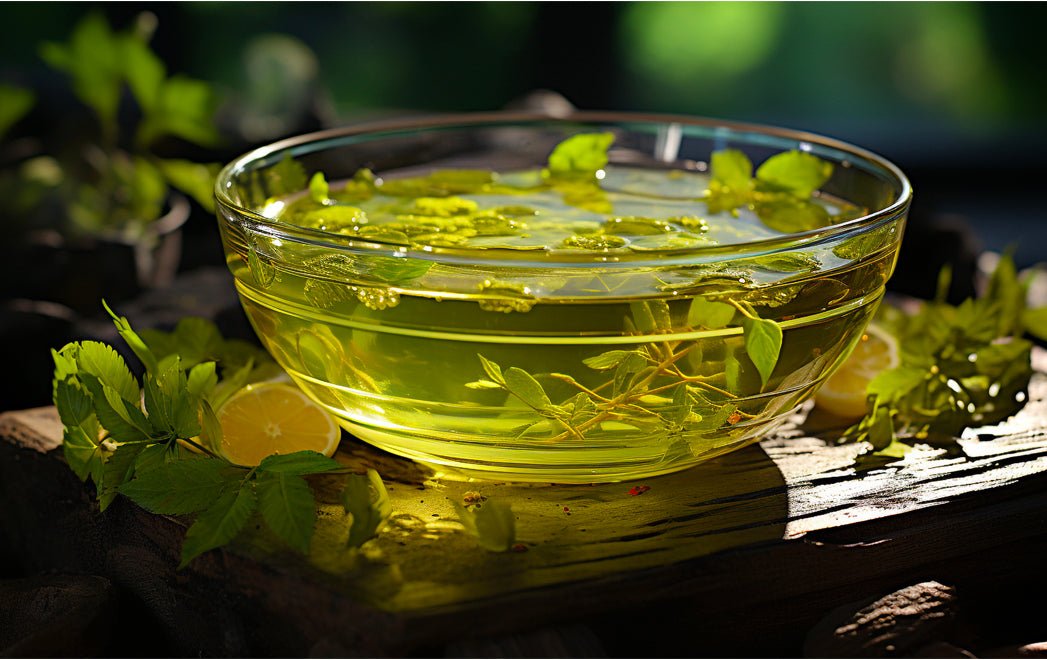
The Amazing Benefits of Tea Tree Oil for Hair Growth and Scalp Health
Are you struggling with hair growth and a dry, itchy scalp? Look no further than nature's gift, tea tree oil. Packed with incredible benefits, tea tree oil is a powerful remedy that can transform your hair and scalp health.
Derived from the leaves of the Australian tea tree, tea tree oil has long been praised for its anti-inflammatory, antifungal, and antibacterial properties. These properties make it an effective treatment for dandruff, scalp infections, and inflammation.
Aside from soothing an irritated scalp, tea tree oil also promotes hair growth. By unclogging hair follicles and nourishing the roots, it encourages healthy hair growth and reduces hair loss. Say goodbye to thinning hair and hello to lush, voluminous locks.
Not only does tea tree oil improve hair and scalp health, but it also adds shine and luster to your hair. Its natural conditioning properties make it an excellent alternative to chemical-laden hair products.
Say goodbye to hair woes and embrace the amazing benefits of tea tree oil for hair growth and scalp health. Incorporate this natural remedy into your hair care routine, and get ready to flaunt healthy, beautiful hair.
The Properties of Tea Tree Oil for Hair Growth
Tea tree oil is packed with properties that promote hair growth. One of its key benefits is its ability to unclog hair follicles. Over time, hair follicles can become blocked by excess sebum, dead skin cells, and product buildup. This can hinder hair growth and lead to scalp issues such as dandruff and itching. Tea tree oil's antifungal and antibacterial properties help to effectively remove these blockages, allowing the hair follicles to breathe and function optimally.
In addition to unclogging hair follicles, tea tree oil nourishes the roots, providing them with essential nutrients. These nutrients help to strengthen the hair shaft, reducing breakage and promoting healthy hair growth. Regular use of tea tree oil can lead to thicker, fuller hair that grows at a faster rate.
Moreover, tea tree oil has anti-inflammatory properties that can soothe an inflamed scalp. Inflammation can disrupt hair growth and contribute to hair loss. By reducing inflammation, tea tree oil creates an optimal environment for hair growth, leading to healthier and more robust hair.
Incorporating tea tree oil into your hair care routine can provide a multitude of benefits for hair growth. Its ability to unclog hair follicles, nourish the roots, and reduce inflammation makes it a powerful tool in achieving thick, healthy hair.
How Tea Tree Oil Promotes a Healthy Scalp
A healthy scalp is the foundation for healthy hair growth. Tea tree oil is renowned for its ability to promote a healthy scalp due to its antifungal and antibacterial properties. These properties help to combat scalp infections and keep the scalp clean and free from harmful bacteria.
One of the most common scalp issues is dandruff. Dandruff is characterized by dry, flaky skin on the scalp, often accompanied by itching. Tea tree oil's antifungal properties make it an effective treatment for dandruff. It helps to eliminate the fungus responsible for dandruff, reducing flakiness and relieving itchiness. Regular use of tea tree oil can help to keep dandruff at bay and provide relief from an irritated scalp.
Tea tree oil also helps to balance the scalp's natural oil production. An excessively oily scalp can lead to clogged hair follicles and scalp issues, while a dry scalp can cause itching and flakiness. Tea tree oil regulates oil production, ensuring that the scalp remains moisturized without being excessively oily. This balance promotes a healthy scalp environment, allowing for optimal hair growth.
Additionally, tea tree oil's antibacterial properties help to prevent scalp infections. Bacteria can thrive on the scalp, leading to inflammation, itchiness, and other scalp issues. Regular use of tea tree oil can help to keep the scalp clean and free from harmful bacteria, reducing the risk of infections and promoting scalp health.
Incorporating tea tree oil into your hair care routine can help to maintain a healthy scalp, preventing common scalp issues such as dandruff, itchiness, and infections. A healthy scalp sets the stage for vibrant and lustrous hair.
Tea Tree Oil for Dandruff and Scalp Infections
Dandruff is a common scalp condition that affects many individuals. It is characterized by flaky skin on the scalp, often accompanied by itching and irritation. Tea tree oil is a natural and effective remedy for dandruff, thanks to its antifungal properties.
The antifungal properties of tea tree oil help to combat the fungus responsible for dandruff, known as Malassezia. This fungus can overgrow on the scalp, leading to flaking and itching. Tea tree oil's ability to eliminate this fungus helps to alleviate dandruff symptoms and promote a healthier scalp.
To use tea tree oil for dandruff, simply mix a few drops of tea tree oil with a carrier oil such as coconut oil or olive oil. Massage the mixture into your scalp, focusing on areas affected by dandruff. Leave it on for about 30 minutes before rinsing it out with a gentle shampoo. Repeat this treatment 2-3 times a week for best results.
In addition to dandruff, tea tree oil is also effective in treating scalp infections. Scalp infections can occur due to bacterial or fungal overgrowth, leading to inflammation and discomfort. Tea tree oil's antibacterial and antifungal properties help to eliminate the harmful bacteria or fungus, reducing inflammation and promoting scalp health.
To use tea tree oil for scalp infections, dilute a few drops of tea tree oil in a carrier oil and apply it directly to the affected area. Leave it on for a few hours or overnight before rinsing it out. Repeat this treatment until the infection clears up.
Tea tree oil is a natural and effective solution for dandruff and scalp infections. Its antifungal and antibacterial properties make it a powerful remedy for these common scalp issues, providing relief and promoting a healthier scalp.
Tea Tree Oil for Hair Loss and Thinning Hair
Hair loss and thinning hair can be distressing, affecting both men and women. Tea tree oil can help to address these issues by promoting hair growth and reducing hair loss.
Tea tree oil's ability to unclog hair follicles is crucial in preventing hair loss. When hair follicles become clogged, hair growth is hindered, leading to thinning hair and hair loss. Tea tree oil's antifungal and antibacterial properties help to remove the buildup that clogs hair follicles, allowing for healthy hair growth.
Furthermore, tea tree oil nourishes the hair roots, providing them with essential nutrients. This nourishment strengthens the hair shaft, reducing breakage and hair loss. By incorporating tea tree oil into your hair care routine, you can promote healthy hair growth and minimize hair loss.
To use tea tree oil for hair loss, mix a few drops of tea tree oil with a carrier oil and massage it into your scalp. Focus on areas where hair loss is noticeable. Leave it on for at least 30 minutes before rinsing it out. Repeat this treatment 2-3 times a week to see the best results.
Tea tree oil can be a valuable tool in combating hair loss and thinning hair. Its ability to unclog hair follicles and nourish the roots promotes healthy hair growth and reduces hair loss, allowing you to achieve thicker, fuller hair.
How to Use Tea Tree Oil for Hair and Scalp Health
Incorporating tea tree oil into your hair care routine is simple and can provide extraordinary benefits for your hair and scalp health. Here are a few ways to use tea tree oil:
- Tea Tree Oil Scalp Treatment: Mix a few drops of tea tree oil with a carrier oil such as coconut oil or olive oil. Massage the mixture into your scalp, focusing on areas of concern. Leave it on for at least 30 minutes before rinsing it out with a gentle shampoo. This treatment can be done 2-3 times a week.
- Tea Tree Oil Shampoo: Look for shampoos that contain tea tree oil as an ingredient. These shampoos can help to cleanse and soothe the scalp while promoting hair growth. Use the shampoo regularly as part of your hair care routine.
- Tea Tree Oil Hair Mask: Create a hair mask by mixing tea tree oil with other beneficial ingredients such as aloe vera gel, honey, or yogurt. Apply the mask to your hair and scalp, focusing on the roots. Leave it on for 30 minutes to an hour before rinsing it out. This can be done once a week for deep conditioning and scalp nourishment.
- Tea Tree Oil Rinse: Add a few drops of tea tree oil to a cup of water and use it as a final rinse after shampooing your hair. This rinse can help to remove buildup, soothe the scalp, and add shine to your hair.
Remember to always dilute tea tree oil with a carrier oil or water before using it on your hair and scalp. Tea tree oil is potent and can cause skin irritation if used undiluted.
Precautions and Side Effects of Using Tea Tree Oil
While tea tree oil is generally safe to use, it is important to take some precautions and be aware of potential side effects.
Firstly, tea tree oil should always be diluted before applying it to the skin or scalp. Undiluted tea tree oil can cause skin irritation, redness, and even allergic reactions in some individuals. To avoid any adverse effects, mix tea tree oil with a carrier oil or water before use.
Secondly, tea tree oil should not be ingested. It is meant for external use only. Ingesting tea tree oil can be toxic and lead to serious health complications.
Additionally, tea tree oil may not be suitable for everyone. If you have sensitive skin or are prone to allergies, it is advisable to do a patch test before using tea tree oil on your scalp. Apply a small amount of diluted tea tree oil to a small area of your skin and wait for 24 hours to check for any adverse reactions.
If you experience any skin irritation, redness, or discomfort after using tea tree oil, discontinue use immediately and consult a healthcare professional.
Other Uses of Tea Tree Oil for Overall Health and Wellness
Tea tree oil is not only beneficial for hair and scalp health but also has various other uses for overall health and wellness.
Tea tree oil can be used as a natural remedy for acne. Its antibacterial properties help to kill acne-causing bacteria and reduce inflammation. Dilute tea tree oil with a carrier oil and apply it to acne-prone areas of the skin.
Tea tree oil can also be used as a natural disinfectant. Its antibacterial properties make it effective in killing germs and reducing the risk of infections. Add a few drops of tea tree oil to water and use it as a household cleaner or hand sanitizer.
Furthermore, tea tree oil can be used to soothe skin irritations and insect bites. Its anti-inflammatory properties help to reduce redness and swelling, providing relief from itching and discomfort. Dilute tea tree oil with a carrier oil and apply it to the affected area.
Tea tree oil has a wide range of uses beyond hair and scalp health. Its natural properties make it a versatile and valuable tool for overall health and wellness.
Where to Buy Tea Tree Oil and Recommended Brands
Tea tree oil is widely available and can be purchased from various stores, both online and offline. When buying tea tree oil, it is important to choose a high-quality and pure product to ensure its effectiveness.
Here are a few recommended brands of tea tree oil:
Always check the label to ensure that the tea tree oil is 100% pure and free from any additives or fillers. Pure tea tree oil is more effective and provides better results.
Conclusion: Incorporating Tea Tree Oil into Your Hair Care Routine
Tea tree oil is a powerful natural remedy that offers amazing benefits for hair growth and scalp health. Its antifungal, antibacterial, and anti-inflammatory properties make it an effective treatment for dandruff, scalp infections, and inflammation.
By unclogging hair follicles, nourishing the roots, and promoting a healthy scalp environment, tea tree oil encourages healthy hair growth and reduces hair loss. It is a versatile and valuable tool for achieving thicker, fuller hair and maintaining overall scalp health.
Incorporating tea tree oil into your hair care routine is simple and can be done through scalp treatments, shampoos, hair masks, or rinses. However, it is important to dilute tea tree oil before use and take necessary precautions to avoid any skin irritations or allergies.
Tea tree oil is not limited to hair and scalp health but also has various other uses for overall health and wellness. From treating acne to disinfecting surfaces, tea tree oil is a versatile natural remedy.
When purchasing tea tree oil, choose a high-quality and pure product to ensure its effectiveness. Look for reputable brands that offer 100% pure tea tree oil without any additives or fillers.
Say goodbye to hair woes and embrace the amazing benefits of tea tree oil for hair growth and scalp health. With regular use, you can transform your hair and scalp, achieving healthy, beautiful locks that you can proudly flaunt.



